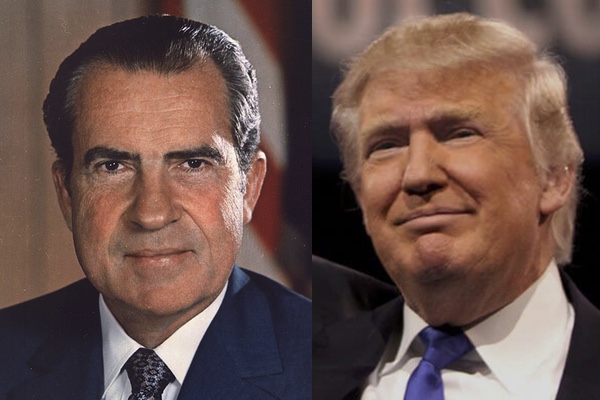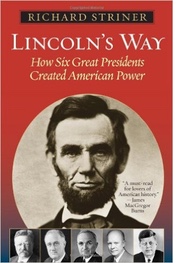What Might Save Us? If Trump’s Another Nixon.

Donald Trump has been compared to Richard Nixon — quite aptly — and the next few years will determine if a bellicose president who worsens American divisions will usher in a sequence of events like the nightmare that lasted from 1969 to 1974.
 Like Nixon, Trump represents the
authoritarian rather than the libertarian proclivities of the right.
And he might just be angry and vindictive enough to make
conservatives tone down the government-bashing and support the kind
of measures they would surely excoriate if any Democrat proposed
them. It is worth remembering that Nixon helped to usher in EPA,
OSHA, and Amtrak and he advocated universal health care insurance in
his first term in office. If Trump wishes to improve upon Obamacare
and give the American people a sensible and simplified health-care
program, he might now be in a perfect position to force it upon his
own party’s obstructionists in Congress.
Like Nixon, Trump represents the
authoritarian rather than the libertarian proclivities of the right.
And he might just be angry and vindictive enough to make
conservatives tone down the government-bashing and support the kind
of measures they would surely excoriate if any Democrat proposed
them. It is worth remembering that Nixon helped to usher in EPA,
OSHA, and Amtrak and he advocated universal health care insurance in
his first term in office. If Trump wishes to improve upon Obamacare
and give the American people a sensible and simplified health-care
program, he might now be in a perfect position to force it upon his
own party’s obstructionists in Congress.
And the infrastructure spending that Trump advocates might go a long way — if properly implemented — toward assuaging the kind of economic distress that was surely one of the motivating factors within his support base.
But if Trump’s programs fail to deliver these kinds of results, then a very dark scenario looms.
In the event that Americans prove to be worse off than ever (in bread-and-butter terms) after several years of his policies, Trump will probably be unable to think up positive solutions. To the contrary, he will feel the urge to find scapegoats
Most likely he will go into denial, blaming everything upon his enemies, actual and imagined. Nixon began to vilify his opponents right away, and he did this even at the height of his power. He sent out his vice-presidential attack dog, Spiro Agnew, to worsen American divisions and incite ever-greater hatred — hatred of the kind that would trigger the shootings at Kent State. Then, when his presidency began to unravel, he kept appealing to his “silent majority” while retreating ever further into his fortress-like White House, scrawling down names on his “enemies list” and cursing the “liberal media.”
Of course Trump doesn’t need a surrogate like Agnew to create such effects in America. He can do it himself. The feeling that America is fragmenting into “two nations” in a state of culture war via the red state/blue state dichotomy may get pushed so far to the brink in the years of Trump that recent crank agitations for secession — emanating from the right wing in Texas and, more recently, the left wing in California — might become quite real as possibilities. It all depends on whether Trump ushers in patterns of hysteria and hatred that cannot be altered, at least in the short run, by countervailing forces.
Stranger things have happened in the long course of history. If people who believe in toleration and pluralism feel under relentless pressure in a hate-filled America, it is not inconceivable that large-scale migrations will ensue.
Much of the vitriol in Trump’s campaign was incited by a right-wing extremist, Steve Bannon, who exemplified the tendency among such people to destroy any basis for compromise. One of the gravest concerns about Trump was his tendency to undermine rational discussion as complex issues were blurred and confused amid a torrent of derisive cat-calls, magnified by the echo-chamber of Twitter, among his followers. And then, when the victory of Hillary Clinton was nullified by the electoral votes from the red states, a feeling of deep despair swept over a great many people in the nation’s urban centers.
The result was reminiscent of the 1920s, when sophisticates like H.L. Mencken felt that the ignoramuses were taking over. And vice versa: people in the hinterland felt frequently under assault by what seemed to them the irredeemable wickedness of urban intellectuals. The moods of the 1920s were transient. But what if some deep and bitter geographical divisions are now being hammered into place by the Trump phenomenon?
We may never live to see the day when the West Coast, the Mid-Atlantic, and New England — plus Illinois and Minnesota — may petition for annexation to Canada, but depending upon how far Trump’s indulgence of the “alt right” neo-Nazis may go (an open question at this writing, since his disavowals have been mild), it is possible that the civil violence and rioting that scarred America during the 1960s and early 1970s may recur, and there is evidence that this process has already started.
But as Nixon brought about his own undoing in the 1970s, Trump’s impulses may lead to a similar result.
All through the 2016 election it was obvious that Trump’s intention was more than the mere quest for power. He seemed determined to make this the ugliest election in the nation’s history, and — with all due allowance for the dirtiness of the tactics employed in the elections of 1800, 1828, 1884, and others — the case can be made that he succeeded beyond his wildest dreams. Well before he and his most fervent supporters embarked upon the character assassination of Hillary Clinton, Trump had turned the Republican primaries into such an unholy trash war of name-calling and rants that a great many party loyalists and devout conservatives declared him impossible to stomach.
And that suited Donald Trump just fine. It seemed part of his purpose to drag politics into the gutter.
To put it bluntly, there is something about this man that keeps driving him to prove, on an ever-increasing scale, that he can get away with breaking any rule that he chooses to break and to do it with an in-your-face belligerence that comes from deep down. And in the process, he whips himself into an extraordinary frenzy that his round-the-clock “tweets” are recording for the ages.
Could it be that Donald Trump feels an uncontrollable urge to defile the things he touches? Why else does he do the sorts of horrible things that he routinely does: make fun of the handicapped, question the proven heroism of his own party’s 2008 presidential nominee, brag (both off the record and on) that conventional standards of decency are targets for him to defy?
Questions about his mental condition have been raised and such concerns are valid. It is all very well to just blurt out whatever comes into your head, make outlandish claims unsupported by facts, then deny that you said those very things or just shrug it all away as the product of a “system” that is “rigged.” Trump did these sorts of things again and again in the 2016 campaign. And it might have been a calculated strategy, a strategy of ruthlessness and effrontery, concocted by a bold and daring cynic.
But if Trump really came to believe that the things he said were all true, he might very well be delusional. And that opens up other possibilities.
It seems likely that a man who feels the impulse to prove that he can get away with anything, no matter how indecent, who lacks self-control, who feels himself surrounded by enemies, whose conscience short-circuits in a manner that no one can predict, a man full of deep and mysterious anger, will cross a certain line in the course of his presidential duties that will bring his achievements crashing down. The circumstances will probably differ from those of the Watergate affair. And the weirdness of the future that is opening up before us is accordingly scary.
Maybe things will all straighten out over time and Donald Trump will begin to calm down. His stance on a number of issues seemed to soften just after his election. But perhaps this was only a lull and the aggression will resume in due course. Perhaps he will get away with everything he tries, and by sinister degrees this country will descend upon a path like the one depicted in Philip Roth’s nightmare novel, The Plot Against America.
Who can say?
But there is reason to believe that the mighty force of Nemesis may save us all in the end. Ralph Waldo Emerson put it this way: “Secret retributions are always restoring the level, when disturbed, of the Divine justice. It is impossible to tilt the beam. All the tyrants and proprietors and monopolists of the world in vain set their shoulders to heave the bar. Settles forevermore the ponderous equator to its line, and man and mote and star and sun must range with it, or be pulverized by the recoil.”
